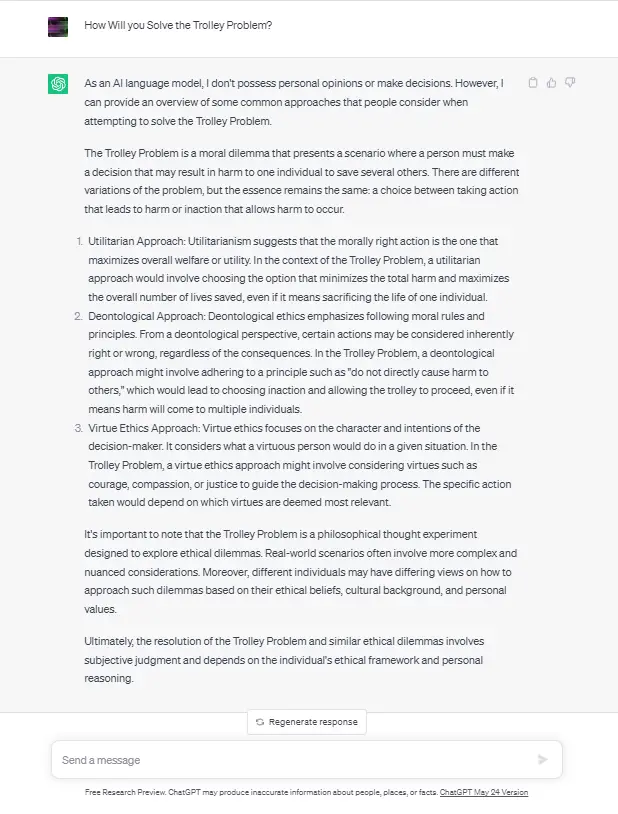How Will ChatGPT Solve the Trolley Problem?Does AI Have a Moral Dilemma?

The emergence of artificial intelligence (AI) has raised thought-provoking ethical questions, including how AI systems, such as ChatGPT, handle complex moral dilemmas like the Trolley Problem. This review article investigates the capabilities of ChatGPT and explores the ethical implications of AI decision-making. By examining various perspectives and potential solutions, this article aims to shed light on the intricate relationship between AI and moral dilemmas.
Table of Contents
What is the Trolley Problem?
The Trolley Problem, a classic ethical dilemma, presents a scenario where an individual must make a decision that may result in harm to one person to save several others. With the rise of AI, it becomes essential to examine whether AI systems, like ChatGPT, face a moral dilemma when confronted with such scenarios. Understanding how AI processes information and the challenges it faces in ethical decision-making is crucial in addressing the broader ethical implications.
How Will ChatGPT Solve the Trolley Problem?
AI systems like ChatGPT rely on algorithms and vast datasets to make decisions. However, AI faces challenges in understanding context, interpreting moral values, and applying ethical frameworks. Despite these limitations, AI can offer valuable insights by considering various perspectives and applying predefined ethical guidelines.

Ethical frameworks such as utilitarianism, deontological ethics, and virtue ethics offer different perspectives on how to solve the Trolley Problem. Utilitarianism suggests maximizing overall welfare, deontological ethics emphasizes adhering to moral rules and principles, and virtue ethics focuses on character and intentions. AI systems like ChatGPT can be programmed to follow specific ethical guidelines based on these frameworks.
Reinforcement learning, a popular approach in AI training, can be utilized to address the Trolley Problem. By shaping an AI agent’s reward system, developers can guide the AI’s decision-making process. Balancing the rewards to consider ethical concerns is crucial, and incorporating human input can further refine AI decision-making.
Building Ethical AI Systems
Designing AI systems with ethical considerations is crucial to ensure responsible decision-making. Transparency, interpretability, and explainability are essential aspects of ethical AI development. By providing insights into AI decision-making processes, users can better understand and trust AI systems. The role of regulatory frameworks and industry standards also plays a vital role in ensuring ethical AI practices.
Does AI Have a Moral Dilemma?
The Moral Agency Debate
Defining moral agency in AI systems is a complex issue. While AI lacks consciousness and subjective experiences, it possesses the ability to make decisions based on programmed rules and patterns. Arguments both for and against AI having a moral dilemma exist, leading to discussions about AI accountability and responsibility.
Potential Implications for Society
The implications of AI decision-making extend beyond theoretical debates. AI can be a valuable tool in enhancing human decision-making, offering unbiased insights and augmenting human capacities. However, societal norms and values may be impacted by the increasing integration of AI in decision-making processes. Ongoing discussions and collaborations between AI developers, policymakers, and society are essential to address potential challenges and ensure ethical AI implementation.
Conclusion
The discussion surrounding how AI systems like ChatGPT handle moral dilemmas like the Trolley Problem is multifaceted. While AI lacks consciousness and subjective experiences, it can process information and apply predefined ethical guidelines. Through reinforcement learning and the incorporation of human input, AI systems can navigate the complexities of ethical decision-making. Responsible development, transparency, and ongoing discussions are necessary to shape ethical AI systems and address the broader implications for society. As AI continues to advance, understanding and addressing the ethical challenges it poses are paramount.

